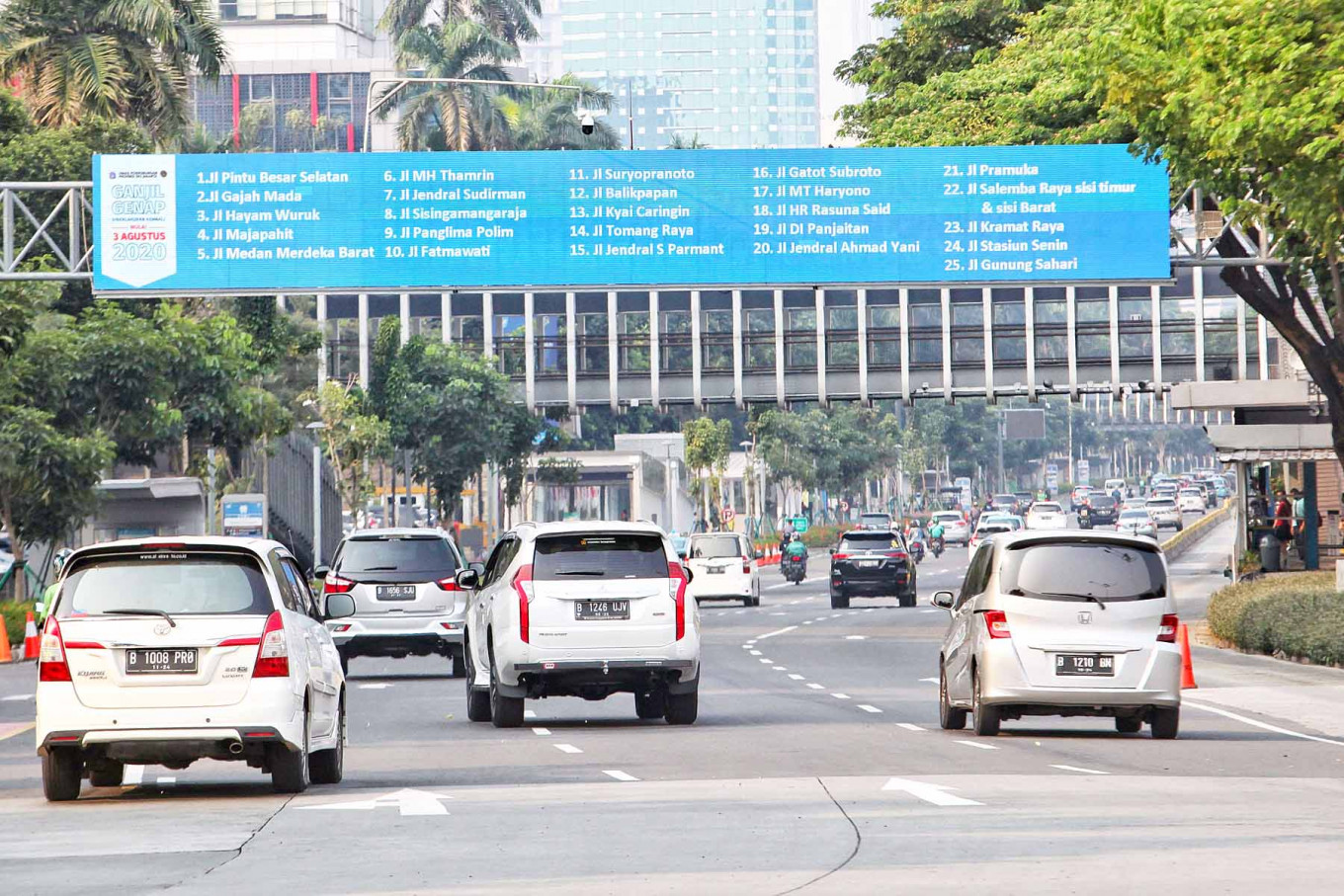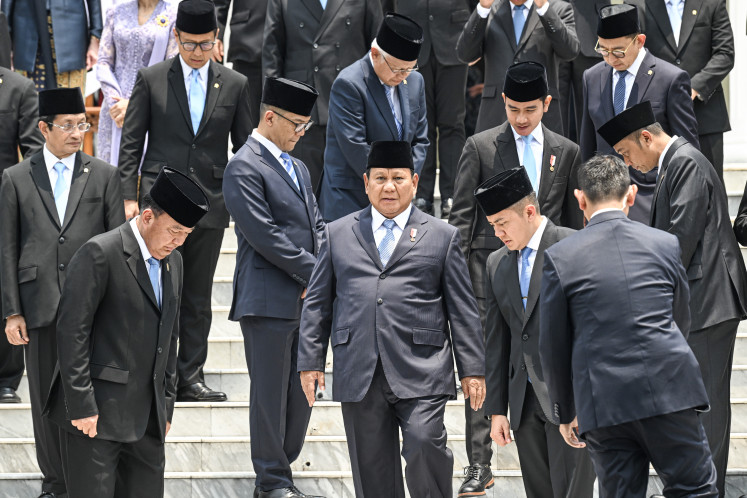Popular Reads
Top Results
Can't find what you're looking for?
View all search resultsPopular Reads
Top Results
Can't find what you're looking for?
View all search resultsCalls grow for online taxis to be exempt from Jakarta odd-even traffic policy
Authorities mull expansion of odd-even rules to pre-pandemic times as congestion picks up
Change text size
Gift Premium Articles
to Anyone
A
s Jakarta relaxes COVID-19 restrictions and the hustle and bustle of the capital slowly returns, civil society has stirred fresh debate over the exemption of online taxis from the odd-even traffic policy that regulates mobility.
Still fresh from the government’s decision to impose the lowest level of community activity restrictions (PPKM) last week, the city has been seeing more commuters return to the workplace as capacity limitations are gradually lifted.
However, with confidence in the use of public transportation still low due to the pandemic, ride-hailing services and online taxis have become the preferred mode of travel for commuters who do not own private vehicles.
The reintroduction and eventual expansion of the odd-even policy, has served to quell the movement of people as part of efforts to keep further COVID-19 transmission in check.
But now the Indonesian Consumer Community (KKI) is calling on the Jakarta administration to exempt online taxis from the traffic policy as congestion returns to the city as a result of easing pandemic curbs.
KKI head David Tobing said that many people heavily relied on online taxis to travel within the city throughout the course of the pandemic, due to concerns over virus transmission in public transportation.
But with things slowly going back to normal, David said the policy did more damage to people’s livelihood than it did saving people’s lives.
“The odd-even policy limits the mobility of online taxis. The government regards online taxis as part of the public transportation [chain], so they should be exempted just like other modes of public transportation," he said in an online discussion on Thursday.
Difficulties resurface
In August, the city administration started reimposing the traffic policy on three major thoroughfares and en route to three popular tourist spots across the city after temporarily lifting restrictions for roughly a year due to the pandemic.
The policy limits access to certain roads to cars with odd-numbered license plates on odd-numbered dates, while cars with even-numbered license plates are only allowed to access the roads on even-numbered dates.
The measures are in effect on weekdays from 6 a.m. to 10 a.m. and 4 p.m. to 9 p.m. for major thoroughfares, while they are in force around tourist spots only on the weekend.
Currently, only motorcycles, electric cars, ambulances, fire trucks and modes of public transportation including buses and conventional taxis are exempted from the policy.
The debate stirs up old technicalities that have prevented ride-hailing services from being considered for exemption.
Sigit Irfansyah, traffic director at the Transportation Ministry’s Greater Jakarta Transportation Agency (BPTJ), said it would still be hard to exempt online taxis from the odd-even policy because authorities cannot distinguish them from other private vehicles.
“Unlike conventional taxis, there are no special marks or license plates to differentiate online taxis from private cars. It's very difficult for our field officers to identify them,” he said in the webinar.
Sigit explained that the government had tried to issue a regulation in 2017 requiring online taxis to use yellow license plates similar to other public transportation vehicles but it was revoked after the drivers filed a lawsuit at the Supreme Court in protest and won.
He said authorities might reconsider reissuing a special license plate or a marker if online taxi drivers demand it.
Expanded routes
Late last month, the Jakarta Police expanded the odd-even policy to 13 thoroughfares due to increased traffic volume following the easing of the prevailing multi-tiered curbs.
According to the Jakarta Transportation Agency's (Dishub) head of road transportation and traffic control, Masdes Arrofi, by the end of October, the number of vehicles on the road had reached 86 percent of the pre-pandemic volume. This number is still rising, he said.
The Jakarta Police’s head of law enforcement for the traffic unit, Adj. Sr. Comr. Argo Wiyono, said that authorities were mulling a further expansion of the odd-even rules to 25 thoroughfares just like before the pandemic, as gridlock has started occurring again across the capital's major thoroughfares as a result of the general easing of curbs.
“If traffic congestion and public mobility indexes increase sharply after the implementation of PPKM level 1, it's quite possible that the policy would be expanded to 25 thoroughfares next week," Argo said.
On Monday, the government further relaxed PPKM implementation in the capital and its surrounding regions to level 1, the lowest in the four-tiered system, following persistent improvements in Jakarta’s COVID-19 indicators.
Under level 1 curbs, malls and traditional markets can now open at full capacity – from the previous half capacity – while offices in nonessential sectors may operate at 75 percent maximum capacity, up from 50 percent.
Argo said the odd-even policy had been effective in improving traffic congestion on the 13 thoroughfares, as travel times and the number of vehicles decreased by 20 and 30 percent, respectively, after the curbs were implemented, while traffic speeds increased by 30 percent.
Not for long
The odd-even policy, which reportedly originated in the United States but has since been implemented in nations as varied as France, India, China and Mexico, has proven to be more effective and clear-cut than the previous three-in-one rules in Jakarta that required vehicles to have at least three passengers to be able to pass through designated thoroughfares at certain times of the day.
But the secretary-general of the Indonesian Transportation Society (MTI), Harya Setyaka Dillon, insisted that the odd-even policy should not be used as a long-term strategy for traffic control, even though it was effective.
“Motorcycles are still exempted from the policy [and] people can also get around the policy by buying a second car with a different license plate number,” he said, citing the main culprits of increased congestion in the capital.
“A more sustainable solution would be to implement the long-awaited electronic road pricing [ERP] system and zone-based parking pricing to encourage more people to use public transportation.”










